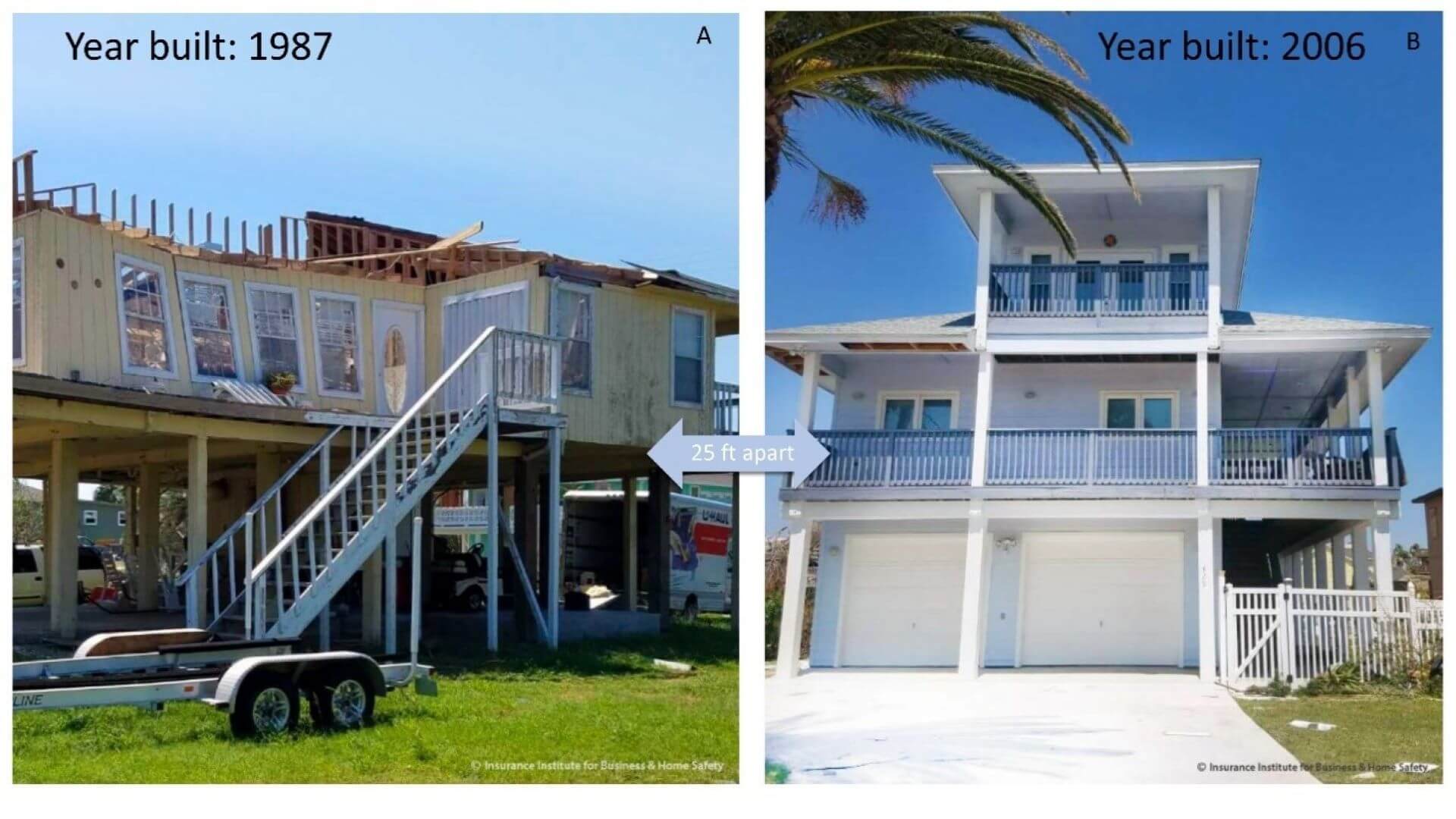How code legislation is a property risk management strategy for physical and financial risk
Co-Authored: Tanya Havlicek, Principal, Science and Analytics at CoreLogic; Ian Giammanco, Managing Director of Standards & Data Analytics and Lead Research Meteorologist, IBHS; William Pogorzelski, Applied Statistician at IBHS; Milad Shabanian, Codes & Standards Engineer at IBHS
Scientists Ian Giammanco, William Pogorzelski and Milad Shabanian from IBHS (Institute for Business & Home Safety) and Tanya Havlicek from CoreLogic had a hypothesis: If building codes could help mitigate physical property risk during a landfalling hurricane — a trend we’ve seen develop since Hurricane Charley in 2004 — could this risk management strategy also help mitigate financial losses, specifically the risk of default over 90 days following a damaging event?
Read the full paper here
A recent joint study by Insurance Institute for Business & Home Safety (IBHS) and CoreLogic® explores how building codes, their history and their adoption impact mortgage payment performance after landfalling hurricanes.
Developing a Collaborative Study
To investigate how building codes can impact mortgage default, IBHS and CoreLogic examined four major landfalling hurricanes affecting areas with a diverse age of building stock, code adoption and enforcement history. Hurricanes Irma (2017), Harvey (2017), Michael (2018) and Laura (2020) were similar with respect to type and scale. The study focused particularly on areas damaged by wind and not water.
First, the research team at IHBS closely examined the history of building codes across the U.S., identifying key milestones in improvements, such as the creation of The National Wind Standard in 2001. Using these milestones in code improvements, researchers identified seven building code eras. Individual properties could then be assigned to an era based on which codes were adopted when the property was constructed.
The scientists then combined the building code specifications data with CoreLogic’s data on loan payment performance, loan/borrower underwriting characteristics, home asset and structure characteristics, and forensic wind speeds at a location during a storm.
Finally, the team examined the correlation between code era adoption, wind damage and mortgage default. Each storm showed a mortgage delinquency uptick from 90 days following the event.
The Findings
The adoption of modern building codes was shown to be statistically significant in reducing mortgage delinquency rates after a hurricane. The study shows that the adoption and enforcement of strong building codes strengthen the resilience of families and the financial sector at large.
- After looking at traditional underwriting risk factors that influence mortgage delinquency rates along with the structure age, the least risky borrowers were in homes built under the era from 2007 to the present day.
- The code group with the oldest homes, which have little in the way of building codes, showed the highest delinquency rates post-hurricane. However, homes built from 2006-2009 showed the highest raw data delinquency rates due to the riskier nature of the loans associated with mortgages from the period. Homes built in the late 1970s and early 1980s were also quite vulnerable. During this era, homes were often built quickly with little code adoption, and the codes that did exist were insufficient.
- Structural improvements and enhancement benefits are only seen during and after hurricanes. Other drivers of default are more prevalent outside of a damaging weather event.

The Ripple Effects of Mortgage Delinquency
Mortgage defaults do not simply affect homeowners, as we saw during the Great Recession. The Journal of Housing Research reported increases in mortgage delinquency rates following extreme weather, illustrating that natural disasters contribute to financial risk in the mortgage market at large.
Researchers have confirmed the link between property damage and mortgage delinquency after Hurricane Harvey (2017) and Hurricane Ida (2021). CoreLogic has also shown a pattern of sharp increases in mortgage delinquencies following climate disasters such as hurricanes, flooding and wildfire.
The Federal Emergency Management Agency (FEMA) estimates that by 2040, the U.S. will have prevented $132 billion in cumulative losses thanks to the adoption of improved building codes. Unfortunately, as of November 2020, 65% of counties, cities and towns across the U.S. still had not adopted modern building codes.
Commenting on the final analysis, Tanya Havlicek, Principal, Science and Analytics at CoreLogic noted:
“What stood out to me were the interactions among traditional underwriting risk variables and building codes. When you look at the raw default data by building code, you do not see the effect clearly. It is only after performing a multivariate analysis accounting for traditional underwriting factors that the signal emerges. We also see that the pattern of default changes from normal times to post-catastrophe periods. The benefit of modern building codes is most significant after a catastrophic event.”
It is perhaps because of this delay in seeing the benefit of modern codes that there is a lag in support for adopting them.
Maintaining documentation on building code adoption history is crucial for state and local code jurisdictions. When combined with property data, this documentation provides an accurate way to evaluate property risk and can be used to help justify the resources needed to maintain and enforce building codes.
Changes to Risk Management Strategies Are Needed in Housing Policy
As climate change brings an increase in catastrophic weather events, we must continue to seek ways to mitigate damage, both physical and financial.
This joint study shows that modern building codes can address both risks, allowing people to stay in their homes and avoid much of the damage, disruption and long-term displacement that follow hurricanes.
“The ability to use science and engineering knowledge to evaluate the vulnerabilities of different building code regimes and to see how real-world data reflected our understanding has opened new areas of study in learning where our vulnerabilities lie. It also gives us a path toward focusing efforts on fostering more resilient construction and retrofits in the areas that need them most,” said Ian Giammanco, Managing Director of Standards & Data Analytics and Lead Research Meteorologist, IBHS.
Housing policy goals should use modern codes and other resilience tools not just to get people housed but to keep people housed after disasters. Adopting and enforcing modern codes benefit all by reducing the risk of mortgage delinquencies for banks, investors, insurers and homeowners.
As Michael Newman, General Counsel at IBHS summarized, “We have long understood the critical role of building codes in managing the physical risks of hurricanes and other natural disasters. With this study, we have a better understanding of the significant role building codes play in managing the financial risks of hurricanes.”
This collaborative study shows that modern building codes help mitigate mortgage delinquency, as well as property risk, following a hurricane. And because the benefits modern building codes provide are visible only after a catastrophic event, it is up to us to ensure that these codes are adopted nationwide and enforced now — before it is too late.
©2023 CoreLogic, Inc. All Rights Reserved.
CORELOGIC and the CoreLogic logo are trademarks of CoreLogic, Inc. and/or its subsidiaries. All other trademarks are the property of their respective holders.

